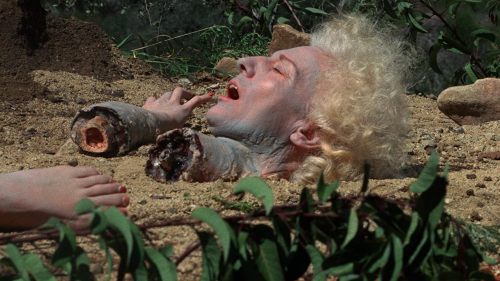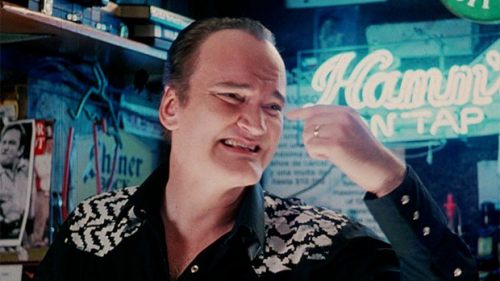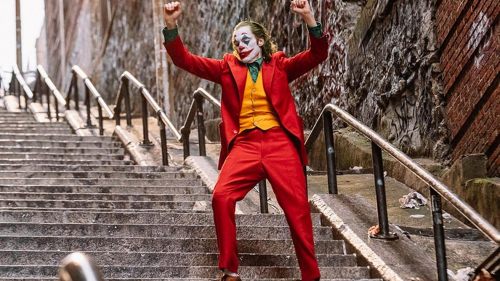You Never Forget Your First Tarantino
Once Upon a Time in Hollywood is out! Get your tickets here!
He had me from the opening scene of Reservoir Dogs. Eight guys seated around a table in some diner, their personalities emerging and clashing as each one shares his opinion on the topics at hand: the real meaning behind Madonna’s “Like a Virgin” and the politics of tipping. We don’t know the characters yet, hell, we barely get to know them at all, but the fact that they’re reciting dialogue written by this particular filmmaker makes us sit up in our seats, afraid of missing a single syllable. Because with Quentin Tarantino, the details are in the dialogue, and like Detective Holdaway (Randy Brooks) tells Freddy (Tim Roth) in the famous “Commode Story” scene, “It’s the details that sell your story.”
Reservoir Dogs was my introduction to Tarantino’s kinetic brand of non-linear storytelling. The blueprint of an extraordinary style the writer/director would take to new levels in every feature that followed. What strikes me to this day is how Tarantino turns the deceptively simple set-up into a complex character-driven extravaganza, all while barely revealing anyone’s name. Amusingly, a seemingly random line of dialogue in the scene where boss man Joe Cabot (Lawrence Tierney) assigns each member of the team their Crayola codename suggests exactly how the story will unravel: “You get four guys all fighting over who's gonna be Mr. Black, but they don't know each other, so nobody wants to back down.” Anonymity gives these professional baddies (and one rat) a dangerously uninhibited amount of ego in the face of their mounting suspicions of one another. And, goddamn, do I love every vulgar and violent minute of it.
“You ever listen to K-Billy’s ‘Super Sounds of the ’70s?’”
You can hear the music, right? Lightening the mood as K-Billy’s (Steven Wright) segments serve as a divider between acts. Six strangers, a diamond heist gone wrong, and all the elements of the story coming together in pieces. It’s fascinating what Tarantino lets the audience in on and, more significantly, what he doesn’t. Earning our respect from the get-go by trusting that we’re smart enough to fill in the gaps. Yet, everything we need to know about these guys lies in the subtext of their conversations. There’s the escalating tension in the rivalry between Mr. Blonde (Michael Madsen) and Mr. White (Harvey Keitel), expertly one-upping each other’s number-one-badass persona through every confrontation. There’s Chris Penn as Nice Guy Eddie, absolutely nailing every line delivery in his attempt to control the situation. This may be his most memorable performance and is undoubtedly his most hysterical. Mr. Pink (Steve Buscemi) recently quit smoking, so it’s no wonder he’s bouncing off the walls. We’ve got flashbacks letting us in on what went down and who the big players are. And, Christ on a cracker, is there a cooler more brutal son of a bitch in all of cinema than Mr. Blonde? By the time he’s dancing around slashing Marvin Nash (Kirk Baltz) in the face with a straight razor, you’re either a Tarantino fan or you’re not.
I could write an entirely separate editorial about Mr. Orange and the exquisite structure of Tim Roth’s performance. The man transitions from sheer panic in the beginning to subdued desperation to playing it “super cool.” And I definitely don’t have the space to gush about “The Commode Story” that could possibly do any justice to it being the perfect demonstration of Tarantino’s style being heightened by the caliber of performance we’ve come to expect from his work. Sure, Orange spends the majority of the film lying in a pool of his own blood waiting to die, but did you ever notice that subtle shift in his body language the second Joe Cabot walks in the door? You can see the relief wash over him. And before that, when he’s explaining to Nice Guy Eddie why he shot Blonde to save the cop, you’re holding your breath as Joe’s words come back to you, realizing Orange’s mistake in presuming to know anything about the kind of guys he’s dealing with here.
It’s these layers and details that keep me coming back for more, not to mention the fact that I notice something new every damn time I watch this movie. I have no doubt that Tarantino is the kind of writer who could answer without hesitation the most mundane questions (ie: first car, favorite color) about any one of the characters he's created. On the surface it might seem he’s revealing very little about these guys, but, even in the subtlest moments, like Mr. Orange rifling through his change for the wedding ring he slips on his finger, or Mr. White’s inherent need to snap his lighter on with his fingers, every detail sells the story.
Maybe you don’t remember the first time you saw a Quentin Tarantino movie, but I think there’s something significant about the film that introduces us to his work. Although, I may not consider Reservoir Dogs to be his best film (sorry, boys, you were knocked down by Inglourious Basterds), it still holds a special place in my heart for being the first. First kisses. First times. First Tarantino? Why not? Let’s make it a thing. Even through the process of writing this I realize I’m only brushing the surface of what the man has accomplished throughout his unbelievable filmography. Nine films into his career with the release of Once Upon a Time in Hollywood, we’ve become accustomed to walking into a Tarantino movie with a certain level of expectation. And let’s be honest, he rarely disappoints, so the bar is set pretty high.
While he’s been saying for ages that he’ll retire after ten films, we’ve been holding on to the hope that maybe he’ll change his mind. After all, making movies was his lifelong dream, he can’t really be calling it quits, right? Sadly, as much as we’d love to keep him tied to entertaining us for the rest of his life, it makes sense he wants to branch out into other mediums. Personally, I can’t wait to read a novel or see a stage production written and directed by Quentin Tarantino. In fact, Reservoir Dogs strikes me as the perfect example of what a night of Tarantino theatre might look like. Wherever his words may land, they’re guaranteed to be worthy of our attention. But as die-hard fans of cinema, it’s sure to be a bittersweet farewell to his irreplaceable talent.



